In the pharmaceutical and biotech manufacturing industries, precision, cleanliness, and safety are paramount. Every aspect of the production process must adhere to strict standards to ensure the quality and integrity of pharmaceutical products. One often overlooked aspect that plays a critical role in maintaining these standards is the flooring.
Why is Pharmaceutical Flooring Unique?
Pharmaceutical flooring is a specialized type of flooring designed to meet the strict industry requirements. Specialized features are needed to maintain a safe and sterile environment for the production and storage of drugs. It must be able to withstand heavy traffic, chemical spills, and other potentially hazardous substances. Pharmaceutical floors must be easy to clean and maintain so that they remain free from contaminants. They must also be slip-resistant and provide good drainage for safety purposes.
There is a wide range of flooring options available for pharmaceutical facilities, including epoxy floor coatings, urethane flooring, and MMA resinous flooring. These flooring materials and systems provide a seamless and durable solution, specifically designed to meet the unique needs of pharmaceutical manufacturing, biotech, labs, and other compliance-driven environments like healthcare.
High Performance Pharmaceutical Floors
High-performance polymer flooring is essential in the biotech, life science, and pharmaceutical sectors. These industries demand durability, cleanliness, and adherence to stringent regulations.
Epoxy flooring, known for its robustness and chemical resistance, is a top choice. It’s seamless, easy to clean, and customizable, making it ideal for laboratories and production areas.
Urethane flooring, with its non-porous surface and resistance to chemicals and impacts, is another valuable option.
MMA (Methyl Methacrylate) floor coatings are favored in pharmaceutical settings due to their rapid curing time, chemical and temperature resistance, and durability.
Resin flooring systems offer anti-microbial properties, slip-resistance and a range of aesthetics.
Static control (ESD) and cleanroom flooring solutions also ensure safety and compliance in sensitive environments, preventing static discharge and minimizing particle generation.
The right high-performance floor solution is a foundation for success in these industries, providing functionality and adherence to rigorous standards.
Seamless Floors are Essential
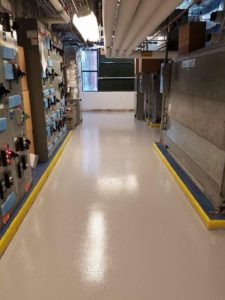
Seamless flooring is precisely what it sounds like: a continuous, smooth surface without joints, seams, or grout lines. This feature alone offers several critical benefits for pharmaceutical facilities.
Seamless floors eliminate the cracks and crevices where dirt, dust, and microbes can accumulate. This makes it easier to maintain a sterile environment, a must in the pharmaceutical industry.
By creating a continuous surface, pharmaceutical flooring solutions provide an easy-to-clean environment that reduces the risk of cross-contamination between products and personnel in the facility.
How to Achieve a Seamless Surface in Your Facility
First, it is important to choose the right type of floor material for the application. Epoxy floors, urethane, and MMA flooring are all excellent concrete floor coatings for pharmaceutical environments. Additionally, it is important to ensure proper installation and application of the chosen flooring material.
Only work with flooring contractors that are fully-insured, qualified, and trained to work with the specific flooring material required for your facility. Professional contractors like Black Bear can value-engineer the best solution for your unique needs as well as install and maintain the floor throughout its life.
Chemical Resistant Flooring in Pharmaceutical Environments
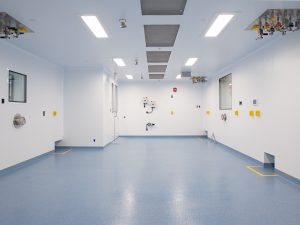
Chemical resistance refers to a type of flooring that is designed to withstand the corrosive effects of harsh chemicals typically found in pharmaceutical facilities. These floors are a vital component in creating a sterile space within pharmaceutical environments.
The best pharmaceutical floors combine both medical-grade certifications as well as extreme chemical resistance. Examples of chemical-resistant flooring are epoxy and urethane concrete floors. They offer superior resistance, making them very popular options.
Key features include:
Pro tip: opt for the highest chemical resistance rating suitable for the types of chemicals used in the lab for maximum durability.
High Traffic Flooring
In pharmaceutical facilities, there’s a constant flurry of activity. Employees and equipment are always on the move. High traffic flooring solutions are designed to handle the heavy flow of people, equipment, and materials without deteriorating or compromising safety standards.
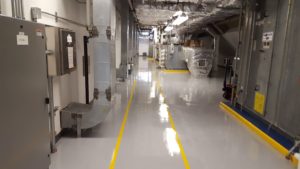
Durability: These flooring solutions are built to withstand heavy machinery, foot traffic, and equipment, making them ideal for the high-impact environment of pharmaceutical facilities.
Easy Maintenance: The absence of seams and grout lines simplifies cleaning and maintenance. Spills can be easily wiped up, reducing the risk of contamination.
Anti-Slip Properties: Many epoxy and resinous flooring solutions can be customized with anti-slip additives to prevent accidents and injuries in areas prone to spills or moisture.
Noise Reduction: These flooring options can also help reduce noise levels in busy pharmaceutical facilities, creating a quieter and more comfortable working environment.
FDA and cGMP Compliance
Safety and compliance are non-negotiable in the pharmaceutical industry, and choosing flooring can significantly contribute to meeting these standards.
The U.S. Food and Drug Administration (FDA) and Current Good Manufacturing Practices (cGMP) regulations set strict guidelines for pharmaceutical manufacturing. Seamless flooring solutions can be designed to meet these requirements, ensuring compliance and peace of mind.
Electrostatic Dissipative (ESD) Flooring
Some pharmaceutical processes require ESD flooring to protect sensitive electronic equipment and prevent static discharge. Epoxy flooring and urethane floors can be customized to meet ESD requirements.
Cleanroom Compatibility
Flooring must meet ISO standards for cleanrooms within pharmaceutical facilities. Seamless flooring can be installed to comply with these standards, ensuring a controlled and contamination-free environment.
Thermal Shock Protection
Temperature resistance is important because pharmaceutical facilities often deal with processes that involve the use of harsh chemicals and high temperatures. Floors that are not equipped to handle these conditions can crack or deteriorate, exposing the underlying concrete and compromising the sterility of the environment. Thermal shock-resistant flooring can withstand rapid changes in temperature without cracking or failing, ensuring the integrity of the sterile conditions.
Impact Resistance
Impact resistance is vital in pharmaceutical manufacturing facilities where heavy equipment is frequently moved or dropped. A flooring system that is not impact-resistant can be easily damaged when subjected to heavy traffic or accidental impacts. This can lead to costly repairs and potential safety hazards for employees.
How Long Does It Take to Install Pharma Floors?
Installing new resin-based floor coatings takes 2-7 days, depending on the size of the space and environmental considerations. Though each area must be evaluated individually, a guide to installation timeframes for seamless resinous pharma floors are as follows:
Do note that the floors need proper cleaning and profiling first to ensure adhesion. Next, primers are applied, followed by the base epoxy layer. This cures overnight before adding top coat layers for thickness and chemical resistance. Each layer requires 12-24 hours of curing based on the product.
What Is the Longest Lasting Flooring Material for Pharmaceutical Spaces?
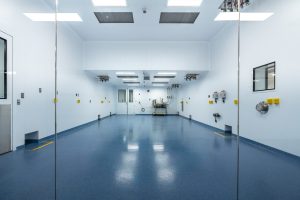
Epoxy and polyurethane floor coatings offer exceptional longevity for pharmaceutical settings. When properly installed, these resin-based floors can last 20-30 years or longer before replacement is needed. The material itself does not degrade or wear out. And the finishes remain coated over time without peeling or delaminating. Their thickness and strength prevent premature damage. So far, their durability makes them a sound long-term investment.
How Much Does Life Science Floor Installation Cost?
On average, professional installation of seamless epoxy flooring or polyurethane flooring costs $6-15 per square foot. However, there are factors impacting the price.
Some of the factors include floor coating type thickness, volume of product needed, surface prep involved, accessory additions like cove bases or drain trenches, regional labor costs, and complexity of the space. Larger spaces generally achieve more cost efficiency. Material selection also impacts the budget, though investing in durable, resinous floors often pays dividends over time compared to inferior solutions like sheet vinyl.
Flooring for pharmaceutical spaces must withstand years of rigorous use without compromising safety or cleanliness- and vinyl and basic applications just won’t cut it. Industrial-grade resin floor coatings are in a league of their own, offering seamless protection tailored to strict demands. Ultimately, investing in durable, resinous floors brings peace of mind today while paying dividends through decades of reliable service in the toughest conditions.
How Do I Choose a Pharma Flooring Contractor?
Choosing an experienced applicator is as important as choosing the right floor system. So, if you are opting for a lab flooring contractor, look out for these key traits:
They should also be able to offer guidance on which systems best suit your facility’s requirements and the chemicals used. This ensures choosing the optimal floor to maximize performance and lifecycle value.
Black Bear is New England’s Leading Pharmaceutical Flooring Installation Company
With years of experience in the industry, we have developed a reputation for providing quality and reliable services that meet the high standards required in sterile processing environments.
Black Bear offers a wide selection of industrial flooring solutions including epoxy, urethane, MMA, and resinous flooring systems. These high-performance resin floor coating solutions are indispensable for the industry. Black Bear’s concrete floor coating solutions offer seamless surfaces, high-traffic resistance, non-slip properties, and safety and regulatory standards compliance.
Our contractors are skilled in maintaining GMP practices, dust control, gowning requirements and always use HEPA filtered equipment to minimize environmental impact.
We have a responsibility to our clients to minimize a project’s impact on the client’s processes, and we take steps to reduce manufacturing downtime and insure a contaminant-free production zone in labs and other CNC spaces.
Black Bear has engineered solutions for many pharmaceutical facilities in Southern New England including: Bio-Rad Laboratories, Bristol Myers Squibb, and Luvak Research Lab.
By investing in the right flooring solutions, pharmaceutical facilities can create a safe, sterile, and efficient working environment supporting their critical healthcare and innovation mission. Contact us for a free on-site assessment.
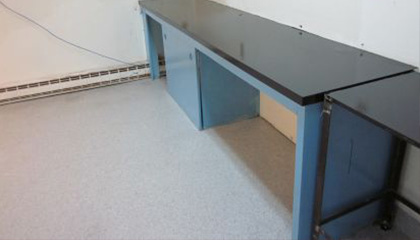
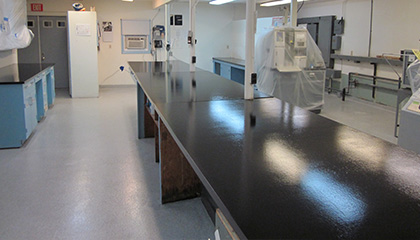
Talk to Black Bear about designing and installing a beautiful, durable surface for your pharmaceutical facility. Fill out the online form and a client representative will be in touch. Or, please call 978-405-0017.
To learn more about industrial flooring for the pharmaceutical industry, check out our guide to choosing the right flooring for life sciences.
Specialized Solutions for:
Industry Compliant
Installed with Little Downtime
High Performance
Sanitary and Easy to Maintain
Skid, Slip & Chemical Resistant